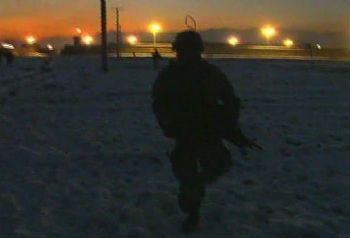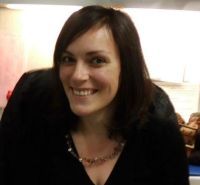
Publisher:
Bonnie King
CONTACT:
Newsroom@Salem-news.com
Advertising:
Adsales@Salem-news.com

~Truth~
~Justice~
~Peace~
TJP
May-23-2013 23:01

 TweetFollow @OregonNews
TweetFollow @OregonNews
If I could Just Save One
Echo Townsend Salem-News.com“We honor the dead best by treating the living well." ~Jennifer M. Granholm
 Kabul, Afghanistan US Army night patrol - 2007 Photo by Tim King Salem-News.com |
(PORTLAND, OR) - I would arrive to work, coffee in hand, and my brain in screen-saver to sit in the same spot in the report room below a paper pinned to the wall that read “You know you are a nurse if…” I stared at the bottom of the nurse bucket-list that read, “Your next project is writing a book titled “Suicide: How to do it right the first time.”
One could argue that health care professionals struggle with the biomedical ethical issues to “do no harm” while preserving an individual’s biological life, but whose quality of life has been severely impacted by a failed suicide attempt. This particular statement, the one listed on the nurse’s print-out, lacks this compassionate thought. Instead it implies the person is a failure because their attempt failed. It implies there are groups of people considered deserving and undeserving of receiving health services.
It implies that rational thought was not employed and the person willingly chose to have their crisis. This interpersonal dialogue devalues and dehumanizes others for their weaknesses, misfortunes, misunderstandings, and even genetics.
This creates Shame. Shame is the inner dialogue a person hears when they want to die and are looking for a reason. Shame is a pathogen to violence.
My first encounter with suicide among active duty military begins when the first units of soldiers returned from Afghanistan and are told they are stoploss to the new war in Iraq. Upon admission to the Mental Health Unit, their possessions are immediately confiscated. A person is stripped of their regular clothes and given purple scrubs to wear. Unlike a patient gown that hides your history, criminal background and socioeconomic class, purple scrubs are purposefully used to distinguish the person from other patients; people know they are from the Mental Health Unit.
Imagine going from wearing a uniform of pride, to a uniform of perceived shame.
The men did not speak to one another. They were not allowed to discuss their “war stories.” They sat in silence, staring at the tables, waiting for their next meals, in their purple scrubs and “high and tights.”
They didn’t know there were others like them sitting there having the same experience. They didn’t know they were not alone in their struggle. They were left there thinking about and feeling their shame. This place only exists to keep them safe from themselves.
Their nurse was pulling medications from the Pixus, “Those boys are just trying to get out of their duty. Don’t pity them. They need to grow up and be men.”
Two of the men overheard her. Their attentiveness suggested they have heard this hypermasculine dialogue of duty, honor, and “being a man” before; therefore, they must be weak failures. This is confirmed when I overhear a man scream at his parents “Fuck you! You don’t get it. You think I am weak.”
Connection is lost when we cannot validate another’s experience.
This dilemma fires closer to home. I came home from work and walked in on my future ex-husband with a hand gun in his mouth. Previous experiences of catching someone in the act of suicide taught me that sometimes the person turns to threaten the one they believe will stop them.
This was no different; I had a gun in my face. Don’t worry, I am still alive.
Earlier that month, he grabbed the steering wheel of my truck on an icy road and tried to kill us both. In both these near death experiences, he morbidly asked me if I felt more alive because I had been closer to death. In both cases, he believed nobody cared if he died because he was a “shitbag soldier” and “weak”.
He was not weak. He was driven. He had dreams to go to Ivy League schools and spent many hours studying for tests, writing essays, and completing paperwork. He learned the Pashto language in 3 months, and befriended Afghan people they didn’t know were enemies or friends with his “charming” use of the language. He was harder on his body than anyone I knew with his sleepless nights.
He instigated fights and slept with numerous women. He would shout at the wall in Pashto in his sleep. He was arrested for breaking into a couple’s house in New Jersey and passing out drunk on their couch. When I had picked him up from the airport in Alaska after a stint of being AWOL, I didn’t recognize him. He had vomit all down his pants.
“How the hell did you get on a plane? They let you on like that? I feel sorry for the person who had to sit next to you.” He had the luck of Disney’s “Jack Sparrow.”
I had tried to get help and went to his Company Commander. “Why are you telling me this?” He says to me frankly.”He is just being weak and trying to get out of his duty. I don’t care what he does to himself as I am leaving for Iraq in 2 months.”
I felt so alone. I remember drinking beer in the barracks commiserating with the guys.
“The military doesn’t care about us.” They said.
I saved lives, damn it. My personal mission statement was “Nobody dies on my shift.” Before the age of 25, I had advocated for Medicaid/Medicare reform for disabled Americans and strengthened a man from paralysis enough to gain his driving autonomy. I knew so much about trauma, but had no idea how to employ my skills to this.
I judged myself a weak loser for my poor rational choice to stay with someone who could not meet my needs. I felt vulnerable like a toddler walking amongst Titans. My work productivity suffered, my health suffered, and my social support diminished.
I passively-aggressively attacked my best friend over her diabetic health concerns; I believed I was watching two people in the process of killing themselves.
I could no longer hide behind the mask of health care professional in my personal life. This is compassion fatigue. When I was in this dark spot, I knew something was not right, but I didn’t know what it was. I felt so much shame for not being able to help myself.
I had this idea from the story of the man who throws beached starfishes back out to the ocean; if I can save just one, then my compassionate efforts were worth it.
Then one day, he texted me a picture of baby birds he found in a bush.
*Disclaimer 1: I worked with a lot of great and compassionate health care professionals and military personnel. These statements in this true story demonstrate that these people hold a diversity of opinions reflected throughout our nation.
*Disclaimer 2: I am not suggesting that individuals should stay in abusive relationships if they believe their significant other is suffering from PTSD. Some relationships have escalated to homicides and murder-suicides. Please get help if you feel you are not safe.

Echo Townsend
Echo Townsend is a recent 2011 graduate from Portland State University, with a Bachelor of Science degree in Community Health.
Raised in Haines Alaska, Townsend is a longtime Oregon resident. Townsend has written nonfiction works regarding the complexity of PTSD, Veterans health issues and also personal memoir.
Townsend continues to write about socially pertinent issues that directly effect veterans and marginalized members of Oregon's diverse and often unseen community populations.
You can write to Echo Townsend at echo.townsend@gmail.com
 |
 |
 |
Articles for May 22, 2013 | Articles for May 23, 2013 | Articles for May 24, 2013






Terms of Service | Privacy Policy
All comments and messages are approved by people and self promotional links or unacceptable comments are denied.
[Return to Top]
©2025 Salem-News.com. All opinions expressed in this article are those of the author and do not necessarily reflect those of Salem-News.com.